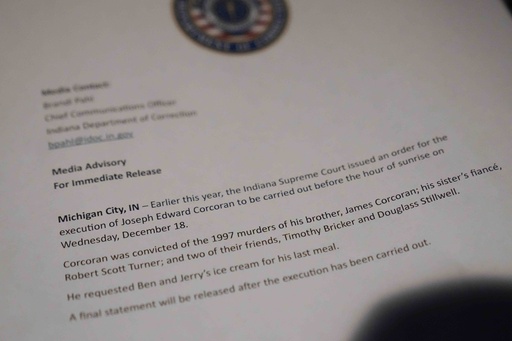MICHIGAN CITY, Ind. — An inmate in Indiana who was found guilty of murdering four individuals, including his brother and his sister’s fiancé, was executed early Wednesday morning, marking the state’s first execution in 15 years.
Joseph Corcoran, aged 49, was declared dead at 12:44 a.m. CST at the Indiana State Prison, as reported by the Indiana Department of Correction. Although Corcoran was set to receive the potent sedative pentobarbital during the execution, the agency’s statement did not specify the drug used. This marked the 24th execution in the United States this year.
Details regarding the execution process were sparse, and, according to state law, media representatives were not allowed to attend. However, Corcoran selected a reporter from the Indiana Capital Chronicle to serve as one of his witnesses, which was confirmed early Wednesday by the outlet’s editor on social media.
Four individuals witnessed the execution through a one-way observation window in a nearby room. Witnessing the event were Corcoran’s attorney Larry Komp, the reporter, and two family members. Komp indicated that the execution lasted eight minutes, although he was only able to see part of the process and could not hear whether Corcoran spoke.
Based on the state’s reports, Corcoran’s final statement was: “Not really. Let’s get this over with.” Komp remarked that it was impossible to determine if Corcoran experienced any pain during the procedure.
Indiana and Wyoming are the only two states that prohibit media attendance at execution events, according to a recent analysis by the Death Penalty Information Center. Witnesses reportedly had a brief six-minute viewing period before blinds were drawn in the observation room. Corcoran, accompanied by his pastor in the execution chamber, was described as being awake, blinking his eyes, but otherwise motionless and silent.
Corcoran was convicted for the July 1997 shooting deaths of his brother, 30-year-old James Corcoran; his sister’s fiancé, 32-year-old Robert Scott Turner; and two other men, 30-year-olds Timothy G. Bricker and Douglas A. Stillwell. Court documents revealed that prior to the shooting spree, Corcoran was under significant stress as his sister’s impending marriage to Turner would require him to vacate the Fort Wayne, Indiana home he shared with his siblings.
While incarcerated, Corcoran reportedly boasted about killing his parents in 1992 in Steuben County, Indiana. Although he was charged in connection with their deaths, he was acquitted.
Last summer, Governor Eric Holcomb expressed intentions to resume executions which had been on hold for years due to a nationwide scarcity of lethal injection drugs. Corcoran’s legal team spent years contesting his death penalty, arguing that he suffered from severe mental illness that impaired his judgment and comprehension.
Earlier this month, his attorneys requested the Indiana Supreme Court to halt his execution; however, this request was denied. Corcoran had exhausted his federal appeals back in 2016, but his legal team petitioned the U.S. District Court of Northern Indiana last week to stop the execution on constitutional grounds related to his mental health. The court refused to intervene, and soon after, the U.S. Court of Appeals for the 7th Circuit did the same.
Subsequently, Corcoran’s attorneys approached the U.S. Supreme Court for an emergency order to postpone his execution, but their request was denied late Tuesday, eliminating any remaining judicial avenues.
Komp expressed disappointment with the decision from the Supreme Court, asserting that Corcoran’s mental health had not been thoroughly evaluated through a proper hearing.
“There has never been a hearing to determine whether he is competent to be executed,” he asserted. “It is an absolute failure for the rule of law to have an execution without following due process.”
With judicial options exhausted, Corcoran’s last hope rested with Governor Holcomb, who had the authority to commute his death sentence. However, that commutation never materialized, allowing the execution to proceed as planned.
At midnight, a group of death penalty opponents began a rendition of “Amazing Grace” outside the prison. Following Corcoran’s execution, Holcomb’s office issued a statement emphasizing that Corcoran’s case had undergone extensive review over the past 25 years, being addressed multiple times by both the Indiana and U.S. Supreme Courts without any changes to his sentence.
The state of Indiana had not executed anyone since 2009, when Matthew Wrinkles was executed for multiple murders committed in 1994. In the years since, federal authorities carried out 13 executions at a federal facility in Terre Haute in 2020 and 2021. Concerns about the availability of lethal injection drugs have caused difficulties for states, forcing them to seek alternatives, often resorting to compounding pharmacies that create medications specifically for execution purposes.
Religious organizations, advocates for disability rights, and others have voiced their opposition to Corcoran’s execution. Late Tuesday, about a dozen protesters gathered outside the prison, some with candles, as Bishop Robert McClory of the Diocese of Gary led prayers, stating that a society can thrive without the government having the power to execute its citizens.
Protesters also held signs, with slogans like “Execution Is Not The Solution” and “Remember The Victims But Not With More Killing.” Abraham Borowitz, the director of Death Penalty Action, referred to the execution as pointless and simply for show.
Prison officials revealed that Corcoran had requested Ben & Jerry’s ice cream as his final meal. He bid farewell to family members, including his wife, Tahina Corcoran, who expressed to reporters outside the prison that they had reminisced about their faith and shared memories, including their time in high school together. She reaffirmed her appeal for clemency from the Indiana governor, explaining that her husband was “very mentally ill” and she did not believe he fully comprehended the gravity of his situation.
“He is in shock. He doesn’t understand,” she said.


